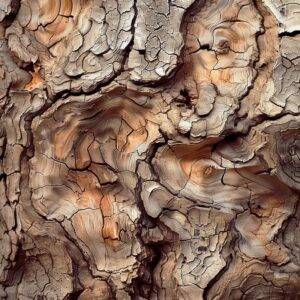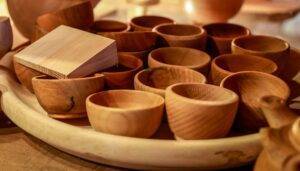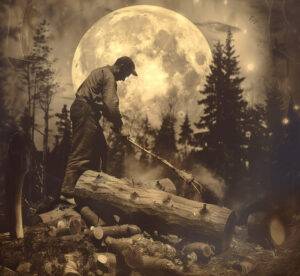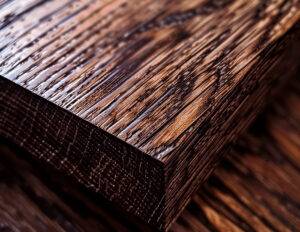Juniper
Juniper wood is known and loved by knife specialists for its filigree or striped pattern and its unique odour. The juniper, widespread throughout Europe, is a hardy shrub or tree that is also valued as an ornamental plant. Its wood, soft yellowish-brown to medium brown in colour, with a pleasant camphoraceous scent, is known for its resistance to insects and its durable nature.
In the past, juniper wood was often used for drinking and eating utensils in Northern Europe, and the wood of the root was often used for this purpose. Today, it is mainly found on our shelves as a high-quality material for knife handles. Its strength also makes it a favourite choice for making handles.
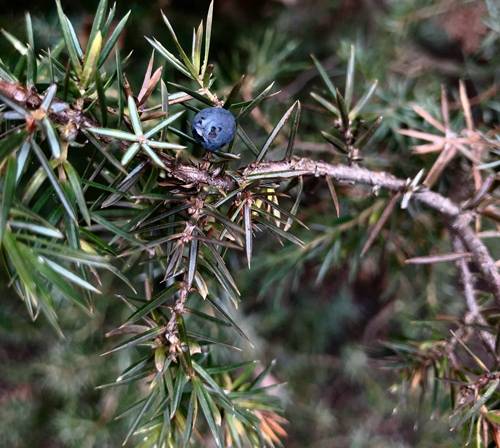
A brief overview of juniper wood:
- Juniper wood has many uses in the kitchen
- Native juniper has special properties
- Smoking with juniper wood gives meat and fish a special flavour
- Juniper and its wood is an elegant all-rounder in the garden
- Juniper wood is used creatively as decoration in the kitchen.
Juniper wood: properties of our native juniper
Our native juniper is an evergreen shrub or tree with a characteristic bark and needles. The wood of the juniper is characterised by its hardness and density, which makes it an ideal choice for use in the kitchen. It is known for its natural resistance to moisture and mould, which makes it a durable material.
In addition, the wood has a pleasant scent of citrus fruits and spices, which adds an extra aromatic note when cooking. The grain of the wood is unique and varies from piece to piece, giving each project with juniper an individual touch.
Smoking with juniper wood: a special flavour for meat and fish
Smoking meat and fish with juniper wood gives the dishes a very special flavour. The smoke from the burning wood penetrates deep into the meat or fish and gives them an intense flavour of citrus fruits and spices. To smoke with juniper wood, you can use either wood chips or whole logs.
For optimum results, you should marinate the meat or fish before smoking so that the flavours can be better absorbed. Then place the juniper wood on the glowing charcoal or in the smoker and allow it to burn slowly. The smoke will gently envelop the meat or fish and give it an unmistakable flavour.
Juniper wood: the elegant all-rounder in the garden
In addition to its use in the kitchen, juniper wood is also extremely versatile in the garden. Due to its natural hardness and resistance to moisture, it is ideal for the construction of garden furniture, fences and decking.
Juniper wood is also extremely durable and resistant to various weather conditions such as rain, snow and sun. It retains its natural beauty for many years without the need for regular treatment.
Juniper wood as decoration: creative ideas for use in the kitchen
Juniper wood can also be used as a decorative element in the kitchen to give it a rustic charm. One option is to use small pieces of the wood as trivets for pots and pans. The unique grain of the wood will certainly be an eye-catcher on your dining table.
Another creative idea is to use juniper wood as a handle for kitchen utensils such as cutlery or chopping boards. The wood is comfortable to hold and gives your kitchen tools a personalised touch.
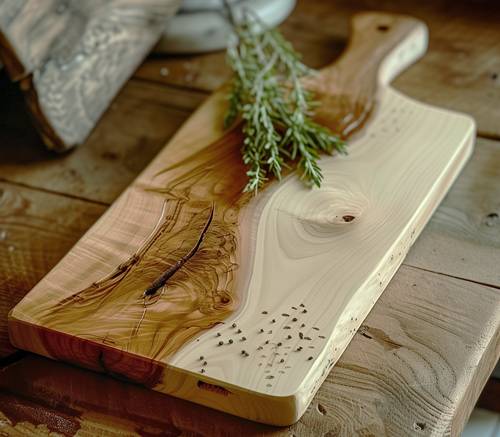
Juniper wood: a dream for wood artists
Juniper wood is a dream come true for wood artists. The unique grain and diverse colours of the wood offer endless possibilities for creative projects. From sculptures to jewellery and furniture, juniper wood allows you to let your imagination run wild.
However, working with juniper wood requires patience and care, as it can be somewhat more difficult to work with than other woods due to its hardness. However, with the right tools and techniques, impressive works of art can be created that bring out the natural beauty of the material.
Juniper wood as tea: health-promoting effect and special flavour
Did you know that juniper wood can also be used to make tea? Juniper tea has a long tradition in folk medicine and is valued for its health-promoting properties. The tea has a characteristic flavour reminiscent of citrus fruits and is slightly resinous.
Juniper tea is often used to aid digestion and detoxify the body. It can also have a soothing effect on bladder infections and other urinary tract infections. To prepare the tea, you can use either fresh or dried juniper berries or the young shoots of the tree.
Conclusion
As we have seen, juniper wood offers a multitude of possibilities in the kitchen and beyond. From smoking to decorating to making tea, using juniper wood adds a special touch to your dishes and brings natural beauty to your home.
We therefore encourage you to incorporate juniper wood into your culinary adventures and realise creative projects with it. The versatile properties of this wood are sure to inspire you and open up new opportunities to fulfil your passion for cooking and craftsmanship.
FAQs
What is juniper wood?
Juniper wood is the wood of the juniper tree, which is native to Europe, Asia and North America. It is used in cooking due to its characteristic flavour and durability.
How is juniper wood used in the kitchen?
Juniper wood is used in the kitchen not only as decorative wood for cutlery and plates and much more, but also as a smoking agent to flavour meat, fish and vegetables.
What smell does juniper wood have?
Juniper wood has a spicy, resinous odour with a hint of citrus and pine.
How long does juniper wood keep?
Juniper wood has a long shelf life and can be used for several years if it is stored in a dry and cool place.
